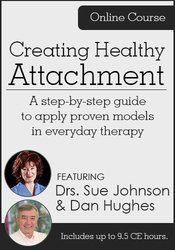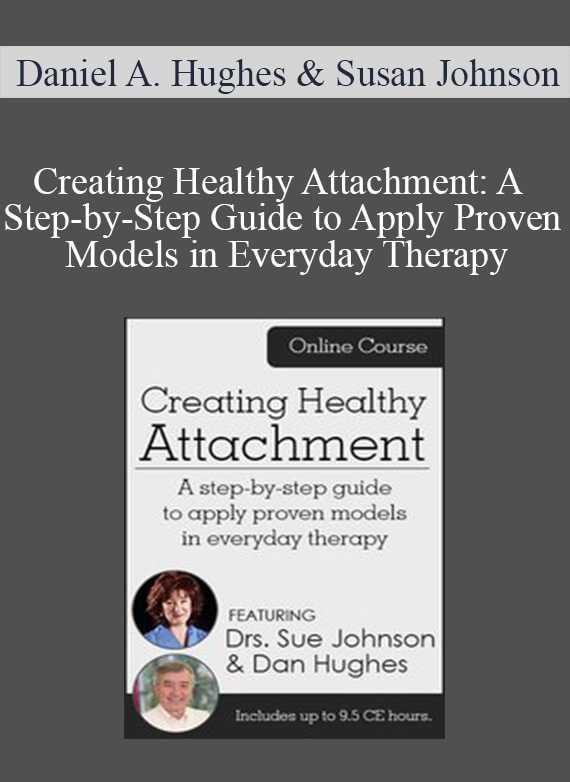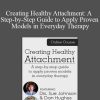Daniel A. Hughes & Susan Johnson – Creating Healthy Attachment: A Step-by-Step Guide to Apply Proven Models in Everyday Therapy
$149.00 Original price was: $149.00.$44.00Current price is: $44.00.
Digital Download: You will receive a download link via your order email
Should you have any questions, please contact us: [email protected]
 Daniel A. Hughes & Susan Johnson – Creating Healthy Attachment: A Step-by-Step Guide to Apply Proven Models in Everyday Therapy
Daniel A. Hughes & Susan Johnson – Creating Healthy Attachment: A Step-by-Step Guide to Apply Proven Models in Everyday Therapy
For years, couple and family therapists failed to provide deep healing because they focused on stopping arguments and teaching clients to fight fair instead of creating lasting change.
Fortunately, advances in our understanding of Attachment Theory has changed our field…
For the first time, we can offer clients secure and satisfying connections by exploring and systematically targeting key elements of the complex dramas that occur within relationships.
In this intensive online course, you’ll discover how to combine the empirically validated Emotionally Focused Couple Therapy, (arguably the most effective and extant intervention for couples) with the healing power of Dyadic Developmental Psychotherapy to help couples, children, and families grow within their relationships – even in the presence of complex issues such as trauma, abuse or neglect.
If you’re ready to help your clients create more loving and affectionate connections with the people they depend on and the people who depend on them, join me and my colleague Dr. Dan Hughes in this intensive online course.
Best,
Dr. Sue Johnson, Ed.D.
Attachment — Cradle to Grave: Intimate and Interactive Conversations with Dr. Sue Johnson and Dr. Dan Hughes
Through intimate and interactive conversations, watch both Dr. Sue Johnson and Dr. Dan Hughes as they take you, step-by-step, through the proven models of Emotional Focused Therapy and Dyadic Developmental Psychotherapy to support the children, families, and couples you work with.

- Understanding the logic behind love
- Exploring the “EFT Tango”
- Examining the “New Era” of couple therapy: The science of attachment theory
- Understanding the importance of a secure emotional connection
- Using EFT to make sense of the nature of relationships

- Changing your client’s responsiveness to threat with EFT
- Focusing on primary affect: How attachment shows you pivotal moments in relationships
- Exploring EFT core assumptions
- Understanding the code of attachment and primary needs
- Mapping the landscape of love with Attachment Theory
- Breaking down the stages and steps of EFT

- Exploring attunement & rhythmic expression
- Understanding the importance of intersubjectivity
- Using curiosity to develop a perception
- Using attachment to understand developmental trauma
- Incorporating self-regulation for the therapist and the child client
- Understanding discipline in secure attachments vs. insecure attachments

- Speaking for the child: Verbal and non-verbal responses
- Using the PACE mode to foster safety
- PACE
- Playful
- Accepting
- Curious
- Empathetic

- How does EFT work with issues of rigid gender views, or a controlling dynamic?
- Creating safety with couples
- Creating safety with children
- What strategy does the therapist use to recognize their emotional response?
- How do you deal with dissociation in children?

- Using a storytelling rhythm to engage children with an affective/reflective component
- Working with parents before the current session
- to assess what’s happened since the last session
- Continuing the rhythm through the hard parts
- of therapy
- Understanding the importance Connect – Break – Repair: How to repair breaks in relationships
- Noticing and making meaning out of non-verbal communication
- Starting sessions with experiential before moving into reflection

- Connecting with your partner: The “Still Face Experiment”
- Exploring how couples react to emotional disconnection
- Understanding the stages of EFT:
- EFT Stage1: De-escalation
- EFT Stage 2: Restructuring the Bond
- EFT Stage 3: Consolidation
- Mastering interventions in EFT through reflection
- Understanding the importance of validation in creating safety
- Explaining why we are designed to co-regulate with other people
- Exploring in-session videos

- Sue Johnson on leading people into their story, and making sense of it
- Dan Hughes on validating both parties on having confidence to go to the heart of the matter
- Sue Johnson on asking “why”
- Dan Hughes on why he uses “why” (within the context of PACE)
- Sue Johnson on validating the positive within an attachment framework
- Dan Hughes on the validation isn’t just observational, but experiential
- Sue Johnson on how both practices involve emotional presence with the clients
- Sue Johnson on intersubjective means both people are affected
- Sue Johnson and Dan Hughes on how do you deal with a parent of teen who puts up a wall?
- Sue Johnson on taking care of the relationship – the bond – and the content will take care of itself

- How do you work with people where there is basic trust lacking?
- How do you work with biological parents who may have caused the trauma?
- Interventions take time, how do you manage the pressure to fix things quickly?
- How do you deal with labels or diagnoses?
- Can you give an example of a disruption or break in connection? What were your repair strategies?
About the Course Experts:

Susan Johnson, Ed.D., is the best selling author, clinical psychologist, distinguished research professor, dynamic speaker, and recognized innovator who has changed the field of couple therapy. She is director of the International Center for Excellence in Emotionally Focused Therapy and distinguished research professor at Alliant University in San Diego, California, as well as professor of clinical psychology at the University of Ottawa, Canada. She trains counselors in EFT worldwide and is recognized as one of the most prominent researchers and presenters in the couple therapy field.
Speaker Disclosures: Financial: Susan Johnson receives compensation as a tenured professor for the University of Ottawa. She receives royalties as an author for Little Brown, ICEEFT, Brunner Routledge, and Guilford Press. Dr. Johnson receives a speaking honorarium from PESI, Inc. Non-financial: Susan Johnson has no relevant non-financial relationship to disclose.

Daniel A. Hughes, Ph.D., is a clinical psychologist specializing in the treatment of children and adolescents who have experienced abuse, neglect, trauma and attachment disorganization. He helped to develop Dyadic Developmental psychotherapy, an attachment-focused treatment model that relies on the theories and research of attachment and intersubjectivity. He is known for creating the PACE Model which facilitates play, acceptance, curiosity and empathy when working with children.
Dr. Hughes is the author of several books including, Building the Bonds of Attachment, 2nd edition, (2006), Attachment-Focused Family Therapy Workbook (2011), and co-wrote Brain-Based Parenting: The Neuroscience of Caregiving for Healthy Attachment. He has provided training and consultations to therapists, social workers and parents throughout the US, Canada, UK, and Australia and provides regular trainings across the United States and Europe. Dr. Hughes received his Ph.D. in Clinical Psychology from Ohio University.
Speaker Disclosures: Financial: Daniel Hughes maintains a private practice. He receives royalties as an author for multiple publishers. Dr. Hughes receives a speaking honorarium from PESI, Inc. Non-financial: Daniel Hughes is President, Board of Directors for Dyadic Developmental Psychotherapy Institute.
Sale Page: https://catalog.pesi.com/sales/bh_c_001207_suejohnson_cradletograve_organic-16000
Archive: https://archive.fo/wip/zWmKR
Delivery Method
– After your purchase, you’ll see a View your orders link which goes to the Downloads page. Here, you can download all the files associated with your order.
– Downloads are available once your payment is confirmed, we’ll also send you a download notification email separate from any transaction notification emails you receive from IMC.sale.
– Since it is a digital copy, our suggestion is to download and save it to your hard drive. In case the link is broken for any reason, please contact us and we will resend the new download link.
– If you cannot find the download link, please don’t worry about that. We will update and notify you as soon as possible at 8:00 AM – 8:00 PM (UTC+8).
Thank You For Shopping With Us!

![[Download Now] Creating Safety with High-Conflict Couples: A Nonverbal Approach – Janina Fisher](https://imc.sale/wp-content/uploads/2022/02/Creating-Safety-with-High-Conflict-Couples-A-Nonverbal-Approach-–-Janina-Fisher-100x100.jpg)



9 reviews for Daniel A. Hughes & Susan Johnson – Creating Healthy Attachment: A Step-by-Step Guide to Apply Proven Models in Everyday Therapy
There are no reviews yet.